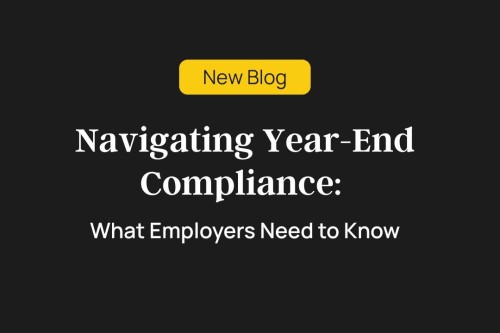
posted 13th November 2025
Completing year-end compliance is one of the most important tasks for employers to undertake before the end of Q4.
It is a valuable opportunity to thoroughly examine employment regulations when hiring seasonal staff, company tax and payroll, review employee benefits and make sure all legal employment obligations are being met.
In this article, we provide employers with guidance on completing year-end compliance including tax documentation, wage and hour laws, employee benefits, employment law updates, record-keeping requirements. We will also provide expert insight from NuStaff on how to prepare for Q4 year-end employment compliance with confidence and how we can support your business with compliance complexities.
Understanding the Year-End Compliance Process
Employers have a responsibility to make sure all correct employment regulations and procedures are complied with. That’s why getting a head start on your year-end compliance in Q4 can help you prepare and adapt for the year ahead.
The year-end compliance process is designed to help employers cross reference and review all aspects of employment undertaken. It also ensures all regulations and legalities have been followed when hiring members of staff.
With Autumn being a time for recruiting seasonal staff or taking on permanent staff, employers need to carry out a review of employment classifications as part of the compliance process.
Areas that need to be examined include:
- Payroll
- PAYE
- Employee data accuracy
- Employee tax codes
- Employee benefits
- Right-to-work documents
- Potential employment law updates
By complying with these areas, employers can avoid penalties and reputation damages and instead build trust, boost employee retention and strengthen their reputation.
Demonstrating Tax Documentation and Payroll Accuracy
With finance at the core of year-end compliances, employers need to conduct a thorough and accurate audit including tax documentation and payroll. By ensuring financial accuracy, employers can mitigate risks regarding temporary staffing and seasonal hiring.
At this stage, employers need to ensure:
- All employees have been correctly processed on payroll
- Accurate submission of P60 and P11D forms
- Accuracy of employee classifications
- Payroll documents, tax codes and tax deductions match with HMRC requirements
- Pension and National Insurance contributions are met for eligible employees
Employee Wages and Working Hours Checklist
Part of the year-end compliance process involves employers examining law regulations regarding employee wages and working hours.
By keeping up to date and abiding by UK government laws and regulations – including employee wages and payment thresholds, employers can stay accountable and avoid penalties. This includes making sure the minimum wage rates and national living wage rates, which came into effect in April 2025, are reflected in the year-end compliance.
To ensure full accuracy, employers must ensure:
- Staff rotas and employee working hours have been met and documented
- All employee annual leave have been correctly met and documented
- They keep up to date with government employment laws regarding wages and working hours ahead of 2026
Company Benefits for Employees
Clear communication about employee benefits also plays a key role for employers when conducting year-end compliance.
When hiring permanent or seasonal staff, it’s crucial to be transparent about employee benefits. This can range from pension schemes, private healthcare to wellbeing services and local discounts. In addition, showcasing that your company promotes diversity hiring and skills gap opportunities strengthens brand reputation along with enhancing employee satisfaction, retention and trust.
To ensure employee benefits have been met, employers can:
- Check if all eligible staff have been correctly enrolled in benefit schemes
- Check if benefits have complied with correct laws and regulations
- Keep up to date and apply any changes to schemes ahead of the new year
- Make sure all employees receive updates on company benefit scheme changes
GDPR Compliance and Document Safe Keeping
It’s essential to keep a safe record of all legal documents when hiring employees - full time, part time or seasonal staff - to ensure an easier process when conducting your year-end compliance. This includes contracts, employee handbooks, HR documentation and up-to-date employee information.
To ensure a smooth year-end compliance process, employers must:
- Ensure GDPR policies and regulations have been followed correctly
- Confirm safe keeping of employee information, payment details and contracts
- Keep a safe and strong record of essential employment paperwork to analyse performances and processes
How NuStaff Can Help You Navigate Your Year-End Compliance
At NuStaff, we know how crucial it is for employers to provide a thorough and accurate year-end compliance for effective outcomes.
That’s why, as a leading staffing agency, we utilise our strong recruitment services and help employers through every stage of the process so they can go into the new year with clarity and confidence.
Our support includes:
- Expert advice on year-end compliance processes
- Navigating payroll and compliance checks
- Guidance on employee benefits, GDPR and document safekeeping compliance
- Scalable recruitment options to address any skills gaps
- Guidance on hiring strategies and employment retention
Contact NuStaff for Expert Advice:
📞 Call us: 03442 645 456
📧 Email: info@nustaff.com
🌐 Visit: www.nustaff.com


